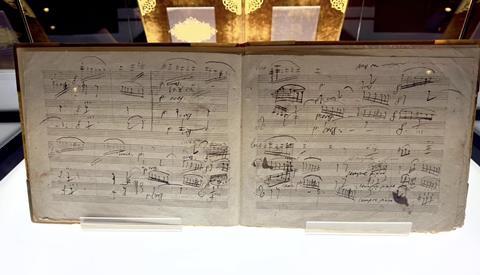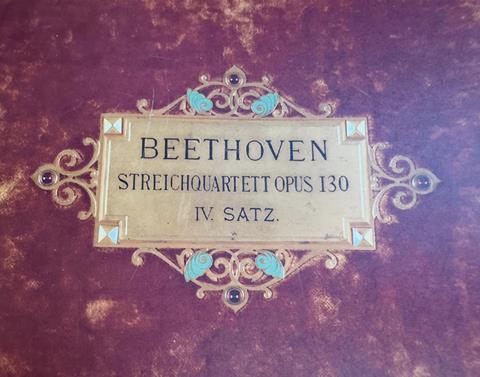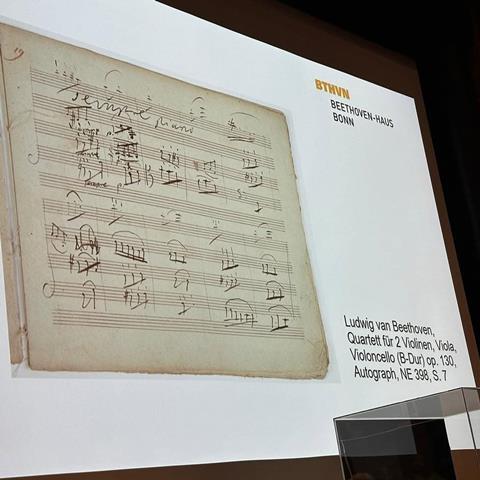Beethoven-Haus Bonn has acquired the autograph manuscript of the fourth movement from Beethoven’s String Quartet op.130 ’Alla Danza tedesca’, which was confiscated by Nazis from the Petschek family during the Second World War

Beethoven-Haus Bonn has acquired the autograph manuscript of a complete movement from Beethoven’s String Quartet in B flat major op. 130, composed in 1825.
200 years after the piece was written, the manuscript of the quartet’s fourth movement ’Alla Danza tedesca’ (German-style dance) was officially received in the Beethoven-Haus on 7 January 2025 at a ceremony attended by Ina Brandes MdL, Minister for Culture and Science of the State of North Rhine-Westphalia, and Markus Hilgert, Secretary General of the Kulturstiftung der Länder, with composer Jörg Widmann giving a keynote speech.
The manuscript was previously in private possession and now completes the institution’s collection of Beethoven-related items. It is being stored at the Beethoven-Haus under optimal conservation conditions and will eventually be integrated into the digital archive, catalogued and publicly accessible online.
Violinist Daniel Hope, president of Beethoven-Haus, commented: ‘We are very happy that we were able to acquire the last known large Beethoven manuscript, which was still in private hands, for our collection.
‘The manuscript is not only one of Beethoven’s most famous string quartets. It is also Beethoven’s only handwritten source for the movement, which was unfortunately under lock and key for decades. How wonderful that I can receive it today and that it can be made accessible to the music world again.’
’How wonderful that the Beethoven-Haus was able to acquire the manuscript of Beethoven’s Alla danza tedesca!’ commented Widmann.
’For me, Beethoven’s String Quartet opus 130 is the string quartet of all string quartets anyway. The rhythmically highly complex, bulky and spiky Alla Danza tedesca movement has always played a huge role for me. This movement forms the basis of my own 8th string quartet, which is why I am all the more pleased to know that this movement is now in good hands at the Beethoven-Haus Bonn.’


The manuscript is thought to have been in the hands of the Petschek family in Aussig (Czech Republic) since the 1920s. As Jews, the Petscheks were persecuted by the Nazis and left their homeland in 1938. Their furniture, valuables and art collection were confiscated by the Nazi authorities. When the German authorities began to realise the art collection in 1942, the head of the music collection of the Moravian Museum in Brno, who was called in as an expert, managed to secure the manuscript for the museum.
After the war, the Petschek family searched for the manuscript - initially without success. When it was finally found, the communist government of what was then Czechoslovakia refused to hand over the autograph. In 2022, it was restituted to the Petschek descendants, who agreed to sell the manuscript to the Beethoven-Haus at the end of 2024 and make it permanently accessible to the public and researchers once again.
The purchase was made possible by a campaign of public and private supporters, together with support from both local and national governmental organisations.
All photos: facebook.com/daniel.hope.page
Read: A long-lost octet receives its world premiere recording - more than 125 years after its composition
Read: Previously unknown Mozart string trio discovered in Leipzig library
The number one source for playing and teaching books, guides, CDs, calendars and back issues of the magazine.
In The Best of Technique you’ll discover the top playing tips of the world’s leading string players and teachers. It’s packed full of exercises for students, plus examples from the standard repertoire to show you how to integrate the technique into your playing.
The Strad’s Masterclass series brings together the finest string players with some of the greatest string works ever written. Always one of our most popular sections, Masterclass has been an invaluable aid to aspiring soloists, chamber musicians and string teachers since the 1990s.
The Canada Council of the Arts’ Musical Instrument Bank is 40 years old in 2025. This year’s calendar celebrates some its treasures, including four instruments by Antonio Stradivari and priceless works by Montagnana, Gagliano, Pressenda and David Tecchler.













































No comments yet